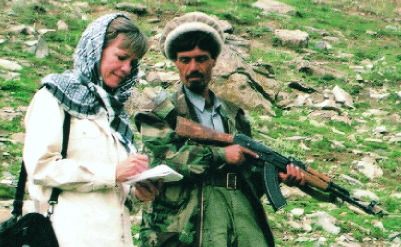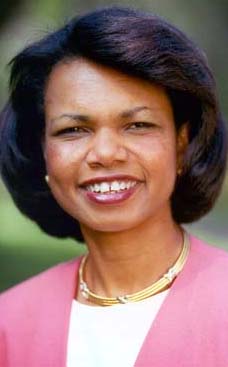2006.03.04: March 4, 2006: Headlines: Journalism: Speaking Out: Santa Cruz Sentinel: Dana Priest calls for Peace Corps for the 21st Century
Peace Corps Online:
Peace Corps News:
Speaking Out:
January 23, 2005: Index: PCOL Exclusive: Speaking Out (1 of 5) :
Archive of Stories:
2006.03.04: March 4, 2006: Headlines: Journalism: Speaking Out: Santa Cruz Sentinel: Dana Priest calls for Peace Corps for the 21st Century
Dana Priest calls for Peace Corps for the 21st Century

"We need to call for a policy solution," she said in an interview. "We need a Peace Corps or a Vista Corps for the 21st century. We need people who are trained with the rigor of the military ... but who can establish a transitional judicial system, build an infrastructure ... or do police work."
Dana Priest calls for Peace Corps for the 21st Century
SANTA CRUZ — For someone who says she avoids opinion, Dana Priest has an intriguing one about U.S. foreign policy.
Caption: Dana Priest interviews an Afghan farmer in the mountains above Shomali in Afghanistan. Photo: NBC/Norman Ng
In her book, "The Mission: Waging War and Keeping Peace with America's Military," she questions the wisdom of the military controlling this country's foreign policy.
"We need to call for a policy solution," she said in an interview. "We need a Peace Corps or a Vista Corps for the 21st century. We need people who are trained with the rigor of the military ... but who can establish a transitional judicial system, build an infrastructure ... or do police work."
Neither the Republicans nor the Democrats are coming close to suggesting such a service, she said. She said that the Democrats "just wait for Bush to mess up," and Bush "doesn't follow through."
It's not just Iraq that's problematic, she said, "the Taliban is back in Afghanistan. So is al-Qaida. What we're doing there is not working.
"We need some sort of national service. Not necessarily military. We need a ton of people to join a government effort to help. It would offer people the opportunity to make sacrifices for their country."
-- Tom Honig, Sentinel editor
soldier-peacekeepers in her new book

soldier-peacekeepers in her new book
Timing is everything. Just ask Washington Post reporter Dana Priest--if you can catch her. Her first book, The Mission: Waging War and Keeping Peace with America's Military, arrived in bookstores this past spring just as jittery Americans prepared for war in Iraq.
She then headed out on a book tour, with stops in eight cities in two weeks, interviews on morning TV shows and C-SPAN, and Council of Foreign Relations speeches. Her vivid account of life with America's military--much of it based on her reporting for the Washington Post--struck a chord. "The reception was just great," she says. "A lot of that had to do with the timing of the book--a lot of people were trying to read about and were wondering about the military."
In the book, Priest warns of a dangerous trend toward having the military handle quasi-diplomatic missions, filling a vacuum left by underfunded civilian agencies. "The face of America is becoming a face with a helmet on," she observed on one TV program.
"On the one hand, you can't help but like the troops, in the sense that they are trying hard, with the wrong tools, to do something they weren't trained for in a culture they don't know," she says. "They don't want to be doing it, and yet they have this very American can-do spirit about them so they're not going to sit around and do nothing."
But despite the soldiers' best efforts, Priest says, "they make some mistakes, and they make some bad mistakes, which gives me pause about what they are doing there." As an alternative, Priest proposes the creation of civilian nation-building forces that are as well organized and well funded as the military. The U.S. experience in postwar Iraq has, if anything, strengthened her view. The U.S. government "grossly underestimated" the need for peacekeepers and a civilian component in rebuilding Iraq, she said. "They didn't send in a lot of troops that could just keep the peace. I wish everything were working better, but I think it will get a lot worse before it gets better--if it gets better at all," she said in June.
While Priest critiques the trend toward soldier-peacekeepers, her high regard for the troops is clear throughout the book. In fact, Priest sees bridging the civilian-military gap as her own personal mission as an author. She cites two key trends she has witnessed as a reporter: "The military was taking on more and more nontraditional duties, while at the same time the civilians who were supposed to tell the military what they should be doing knew less and less about the military."
This lack of knowledge can lead to unhealthy stereotypes--something Priest says she witnessed during her years in college. "The antimilitary feeling, I believe, is often totally misplaced. It is not the military's decision to go anywhere--it is the civilians' decision to send them there. All these missions are not their choosing; they get sent there by somebody not in uniform."
Following years as the Washington Post's Pentagon correspondent, Priest spent eight months on the newspaper's investigative reporting team for a series about America's regional military commanders. The series, "The Proconsuls," earned her the Gerald R. Ford Prize for Distinguished Reporting on the National Defense and forms the basis for part of her book. She also received a research and writing grant from the MacArthur Foundation to write the book.
Priest has traveled widely with both military leaders and troops in the field. Whether in Colombia, Afghanistan, Kosovo, or Nigeria, Priest says she did not feel in danger, but did have "some hair-raising experiences." One time in Nigeria, she took a two-hour ride in an old Soviet helicopter from the capital into the bush. The helicopter was "combat flying" she explains-- "They go as low as they possibly can, because it's harder to shoot at a helicopter if it's flying past you quickly. So you really hug the Earth--or the trees, or the river, whatever." She sat up front, in the "place of honor" without so much as a door to shut next to her. "There were times when I put my feet up--it just felt like we were coming so close to the water."
Priest, who took a leave from the Post to write The Mission, stays a little closer to home these days. She lives in Washington near the White House with her husband, William Goodfellow, executive director of the Center for International Policy, and their two children. Still, Priest keeps a hectic pace--she barely took time to unpack from her book tour before she was back in the newsroom breaking major intelligence stories that appeared in newspapers around the nation in the days leading up to the invasion of Iraq.
Those stories made her a frequent guest on TV news and discussion programs during the war and its complicated aftermath, and she is now an analyst for NBC.
Not one to slow down, Priest would like to do another book, though she declines to go into detail for fear of jinxing the project. Writing a book appeals to her reporter's curiosity, she says. "You peel back the onion, keep peeling it back, and really get closer to the truth about a subject."
-Louise Gilmore Donahue
When this story was posted in March 2006, this was on the front page of PCOL:





Peace Corps Online The Independent News Forum serving Returned Peace Corps Volunteers
 | March 1, 1961: Keeping Kennedy's Promise
On March 1, 1961, President John F. Kennedy issues Executive Order #10924, establishing the Peace Corps as a new agency: "Life in the Peace Corps will not be easy. There will be no salary and allowances will be at a level sufficient only to maintain health and meet basic needs. Men and women will be expected to work and live alongside the nationals of the country in which they are stationed--doing the same work, eating the same food, talking the same language. But if the life will not be easy, it will be rich and satisfying. For every young American who participates in the Peace Corps--who works in a foreign land--will know that he or she is sharing in the great common task of bringing to man that decent way of life which is the foundation of freedom and a condition of peace. " |
 | The Peace Corps Library
The Peace Corps Library is now available online with over 40,000 index entries in 500 categories. Looking for a Returned Volunteer? Check our RPCV Directory. New: Sign up to receive PCOL Magazine, our free Monthly Magazine by email. Like to keep up with Peace Corps news as it happens? Sign up to recieve a daily summary of Peace Corps stories from around the world. |
 | Paid Vacations in the Third World?
Retired diplomat Peter Rice has written a letter to the Wall Street Journal stating that Peace Corps "is really just a U.S. government program for paid vacations in the Third World." Director Vasquez has responded that "the small stipend volunteers receive during their two years of service is more than returned in the understanding fostered in communities throughout the world and here at home." What do RPCVs think? |
 | RPCV admits to abuse while in Peace Corps
Timothy Ronald Obert has pleaded guilty to sexually abusing a minor in Costa Rica while serving there as a Peace Corps volunteer. "The Peace Corps has a zero tolerance policy for misconduct that violates the law or standards of conduct established by the Peace Corps," said Peace Corps Director Gaddi H. Vasquez. Could inadequate screening have been partly to blame? Mr. Obert's resume, which he had submitted to the Peace Corps in support of his application to become a Peace Corps Volunteer, showed that he had repeatedly sought and obtained positions working with underprivileged children. Read what RPCVs have to say about this case. |
 | Why blurring the lines puts PCVs in danger
When the National Call to Service legislation was amended to include Peace Corps in December of 2002, this country had not yet invaded Iraq and was not in prolonged military engagement in the Middle East, as it is now. Read the story of how one volunteer spent three years in captivity from 1976 to 1980 as the hostage of a insurrection group in Colombia in Joanne Marie Roll's op-ed on why this legislation may put soldier/PCVs in the same kind of danger. Latest: Read the ongoing dialog on the subject. |
 | PC establishes awards for top Volunteers
Gaddi H. Vasquez has established the Kennedy Service Awards to honor the hard work and service of two current Peace Corps Volunteers, two returned Peace Corps Volunteers, and two Peace Corps staff members. The award to currently serving volunteers will be based on a demonstration of impact, sustainability, creativity, and catalytic effect. Submit your nominations by December 9. |
 | Friends of the Peace Corps 170,000 strong
170,000 is a very special number for the RPCV community - it's the number of Volunteers who have served in the Peace Corps since 1961. It's also a number that is very special to us because March is the first month since our founding in January, 2001 that our readership has exceeded 170,000. And while we know that not everyone who comes to this site is an RPCV, they are all "Friends of the Peace Corps." Thanks everybody for making PCOL your source of news for the Returned Volunteer community. |
Read the stories and leave your comments.

Some postings on Peace Corps Online are provided to the individual members of this group without permission of the copyright owner for the non-profit purposes of criticism, comment, education, scholarship, and research under the "Fair Use" provisions of U.S. Government copyright laws and they may not be distributed further without permission of the copyright owner. Peace Corps Online does not vouch for the accuracy of the content of the postings, which is the sole responsibility of the copyright holder.
Story Source: Santa Cruz Sentinel
This story has been posted in the following forums: : Headlines; Journalism; Speaking Out
PCOL31888
00
|
By Anonymous (dialup-4.240.198.53.dial1.phoenix1.level3.net - 4.240.198.53) on Thursday, March 30, 2006 - 6:41 am: Edit Post |
170,000 is a bogus number. This is due to double counting people who were RPCVs and staff and who were PCVs in more than one country and does not discount RPCVs who are deceased. This number is used for lobbying but there is not a high consensus among RPCVs with regard to most advocacy issues promoted by the National Peace Corps Association etc.















